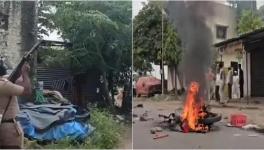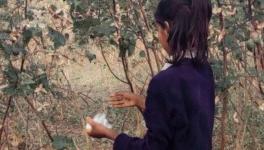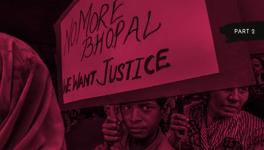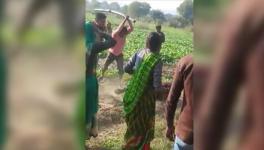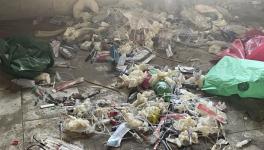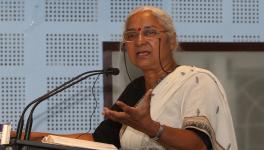Nine Years on, Tribals in MP Continue Their Struggle Against Chutka Nuclear Plant
Image Courtesy: Counterview
New Delhi: ‘Jaan de denge magar zameen nahin denge (I will give my life but not my land)’ says Meera Bai, as she shies away from the mic, but raises her hand in agitation. Many women on the ground, including Meera Bai, are leading a movement in a small district of Madhya Pradesh – Mandla. Their collective resistance against the construction of Chutka nuclear plant enters its 10th year. Their struggle is not against ‘development’, but the predatory forms of development.
At a press conference here, Abha Bhaiya, the key researcher from the Women’s Rights Network (WRN), highlighted the adverse impact of this development-induced displacement in the state. Unveiling their report on the struggles of women, she said, “The nation is becoming anti its own people. There is no accountability of the government which is rendering support to the profit-making vultures.”
The construction of this nuclear plant would mean a third displacement for the people within the same generation. The latest project proposed in 2009, by the Nuclear Power Corporation of India Ltd (NPCIL), hopes to set up an atomic power station in Mandla district of Madhya Pradesh, to generate 1,400 MW power, with the Madhya Pradesh Power Generating Company Limited (MPPGCL) as its nodal agency to facilitate the execution of the project. Two nuclear plants of capacity 700 MW each are being planned in the near future by the NPCIL, which is likely to be followed by two other plants of the same capacity – 2800 MW in total.
The report by the WRN highlights that this plant is likely to consume seven crore 25 lakh 76 thousand cubic meter water every year from the reservoir which will be reduced from the total flow of water in the Narmada River. Activists on the ground allege that the tribals are being pressured to give away their land in a systematic attempt by the government to commercialise and sell off the resourceful Narmada Belt to the big corporate firms.
In its previous attempts, the MP government went ahead with the decision to construct 30 major, 135 medium-sized and 3,000 small dams. These projects have reportedly displaced multitudes of people, affecting their lives and livelihoods. The original inhabitants – tribal people – had organised their struggle under the Narmada Bachao Andolan (NBA) in 1989. As a continuum, Bargi, which is the name of the village and the site where the dam is built, is one of the first completed dams among the chain of 30 major dams to be constructed on river Narmada. One hundred and sixty-two villages in districts Mandla, Seoni and Jabalpur were affected, submerging about 82 villages completely.
The tribal people from the villages Chutka, Tatigath and Kundla have lived memories of their earlier struggle against the Bargi Dam project. For the villagers, after living in the area surrounding the proposed plant site and having been displaced twice earlier during the Bargi dam construction, a nuclear plant in and around the village is a revival of the threat of forced displacement. There are 54 villages that will reportedly bear the dangerous consequences of the NPP.
Chutka Virodhi Sangharsh Samiti reiterated that the Mandla district, where the power plant is to be constructed, comes under the fifth schedule of the Constitution, and also comes under the purview of the PESA Act, 1996. The government is required to seek consensus of the inhabitants before giving any clearance the NPP. However, the government has allegedly been flouting the stipulated norms. Navratan Dubey, a member of the Samiti, explained, “The tribals on the ground, through their resistance to public hearings, managed to ensure that the two public hearings were not conducted. For the third time, the police barricaded the region and militarised the district to ensure that the villagers do not get to voice their concerns. Irrespective of all the efforts made from their end, over 7,000 people turned up, and the process had to be stalled.”
The locals are working to expose the nexus between the government, the MNCs and private firms. The Chutka nuclear plant is a product of a Korean MNC which is funding the project via NPCIL. The repeated attempts by the government to mount pressure have led the locals to believe that the state is “corporate-friendly” instead of being “people-friendly”. Abha Bhaiya says that this has only strengthened people’s conviction to fight. The women at the forefront of the struggle had ensured that the survey by the contractors does not take place; many had even stalled the drilling process.
Meera Bai adds, “Humein machine rokna hi tha. Hamare bhavishya ka sawal hai (We had to stop them. It is a question of our future). The women had to resort to these measures, as in 2010, survey teams were sent to the area without any intimation to the locals. The insensitivity of the state intensified in 2012 with the authorities assembling the police and using force to break the movement. In the same year, attempts were also made to pass a resolution to change the land use of the area from agriculture to wasteland to facilitate land acquisition. The villagers were also threatened that if they did not cooperate, the land would be acquired by force.
During the nine-year-long struggle, at multiple instances, the government reportedly tried to offer abysmally low compensation to the people. Even after exhibiting overt opposition to the project, their accounts were credited with that amount. It was later discovered by the tribals that their Aadhar information was allegedly shared by the banks without their consent. Commenting on the amount that was transferred, Dubey said “Kaudiyon ke daam ka muawza deti hai ye sarkar. (They have paid us in pittance.)”
Apart from these measures, the tribals also alleged that in order to silence the protesters, the state has tried to falsely implicate the tribals in the cases of theft, killing of animals, fraudulent ownership of land etc. Many were also reportedly threatened with eviction notices.
The NPP project has not received environmental clearance from a legitimate and appropriate authority so far. Without this clearance, appropriation of the land and the project-related activities is deemed as against the law of the land. The environemental
impact assessment (EIA) filed by the corporation, was conducted by the National Environmental Engineering Research Institute, which is a technical support institute and not the authentic agency to give environmental clearances. However, till date, the proposed project has not received clearance from the Ministry of Environment, Forests and Climate, which is the authentic body to provide the clearance. Additionally, NPCIL is a non-tribal company. Therefore, the allocation of the tribal land in favour of the company by the government is unconstitutional, and goes against the mandate of the fifth schedule.
Madhya Pradesh has several hydroelectric power plants and 19 thermal power plants, thereby providing surplus of resources and electricity, while many of them are not even utilised to their full capacity. The people, therefore, question the governments’ need to build such a plant, which comes with potential human and environmental costs. Currently, the state’s agenda to push for the NPP is being met by a renewed commitment to ensure immediate cancellation of all nuclear power projects in India including Chutka NPP.
Get the latest reports & analysis with people's perspective on Protests, movements & deep analytical videos, discussions of the current affairs in your Telegram app. Subscribe to NewsClick's Telegram channel & get Real-Time updates on stories, as they get published on our website.









